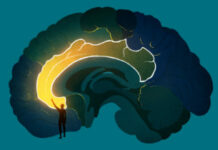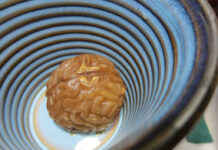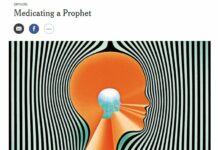Webinar Discussion – Rethinking Madness
A free recording of last week's webinar anchored to Phil Borges' Crazywise, a documentary exploring alternative approaches to mental health, is now available. Over 4,000 people...
Nutrient Supplementation Improves Outcomes for Patients Diagnosed with Schizophrenia
A review article and meta-analysis of 18 articles published in the journal of Psychological Medicine reported effects of vitamin and/or mineral supplements on psychiatric symptoms in people diagnosed with schizophrenia. The study provides evidence of the beneficial effects of taking certain vitamins and minerals for improving symptoms associated with schizophrenia.
More Experience Hallucinations Than Previously Thought
From RTÉ: A recent study found that over 4 percent of all people have experienced hallucinations, which is far more than had previously been thought. Contrary...
This is Solitary
In this piece for The Atlantic, Natalie Chang explores the devastating psychological trauma of solitary confinement.
"That is the legacy and the cost of solitary confinement: The...
DARPA’s Brain Chip Implants: Breakthrough or Total Disaster?
From Gizmodo: Some researchers believe that deep brain stimulation - a surgical procedure involving the implantation of electrodes that send electrical signals to specific areas...
The Psychiatrist who Wanted to Make Madness Normal
From BBC: RD Laing, Scotland's most famous psychiatrist who has been revered as the "high priest of anti-psychiatry," is the subject of a new film called Mad...
B Vitamins Reduce Schizophrenia Symptoms
From Hindustan Times: Treatments using high-dose B-vitamins, including B6, B8, and B12, can considerably reduce symptoms of schizophrenia.
Article →
What Shyamalan’s ‘Split’ Gets Wrong About ‘Dissociative Identity Disorder’
Mental health advocates warn that the film stigmatizes dissociative identity disorder and may directly impact those living with it. "You are going to upset and...
Researcher Acknowledges His Mistakes in Understanding Schizophrenia
Sir Robin Murray, a professor at the Institute of Psychiatry, Psychology, and Neuroscience in London, states that he ignored social factors that contribute to ‘schizophrenia’ for too long. He also reports that he neglected the negative effects antipsychotic medication has on the brain.
Brain Scans Cannot Differentiate Between Mental Health Conditions
A new study analyzing over 21,000 participants found that differences in activation of brain regions in different psychological “disorders” may have been overestimated, and confirms that there is still no brain scan capable of diagnosing a mental health concern.
BPS Releases Review of Alternatives to Antipsychotics
BPS releases report encouraging behavioral interventions for people with dementia, rather than antipsychotics
Acute Respiratory Failure More Likely in COPD Patients Prescribed Antipsychotics
Researchers recommend that healthcare professionals be vigilant regarding the signs of respiratory failure among patients with COPD who are receiving antipsychotics, especially during the initial treatment phase.
“How I Cope With the Three Unwanted Voices That Live Inside my Head”
What now? I’m frightened of being labelled mentally ill.
Mental Health Nurses Do Not Routinely Assess for Effects of Antipsychotic Medications
Researchers believe that side-effect monitoring is critical because of the increase in the use of antipsychotics
Study Suggests Long-Term Antipsychotic Use May Result in Poorer Cognitive Functioning
Association found between long-term antipsychotic use and poorer performance on cognitive tasks in adults diagnosed with ‘schizophrenia.’
“The Lizard Inside”
For aeon, Roberta Payne, a professor of literature and the author of Speaking to My Madness: How I Searched for Myself in Schizophrenia, writes...
Stigma May Increase Distress in Individuals Who Hear Voices
Review finds that stigma around voice hearing is connected to isolation, secrecy, and poorer functioning.
Review Questions Long Term Use of Antipsychotics
Patients who recover from a single episode of psychosis are often prescribed antipsychotics long-term, despite a lack of evidence for this practice
Safety Analysis Weighs Harms and Benefits of Antipsychotic Drugs
The researchers find that the drug effects for reducing psychosis are small and that treatment failure and severe side effects are common.
Who is at Risk for Psychosis?
A report conducted by UK-based researchers indicates that rates of psychosis tend to be higher in ethnic minority groups and in individuals from lower socioeconomic backgrounds.
Curing Schizophrenia via Intensive Psychotherapy
I believe that an Intensive Psychotherapy can lead to healing and, often, a cure of psychotic states. By cure I mean the cessation of delusions and hallucinations, and a gradual titration off of antipsychotic medication, with the cure lasting—even without continuing psychotherapy.
Study Finds High Risk for Suicide Following Psychiatric Hospitalization
Patients are at an increased risk for suicide during the three months immediately following discharge from an inpatient psychiatric hospital.
“Medicating a Prophet”
In the New York Times Sunday Review, Irene Hurford, a psychiatrist, reflects on the ethics of forced treatment for psychosis. “As doctors,” she writes,...
Rejecting the “Medications for Schizophrenia” Narrative: A Survivor’s Response to Pies and Whitaker
As a psychiatric survivor who has personally experienced severe psychosis, my criticisms focus on the relative lack of attention to what psychiatric drugs actually are, and on the uncertain, contested nature of the supposed target of these drugs: “schizophrenia.” I will elaborate on each of these points with references, as well as highlighting alternative approaches to helping psychotic people.
German Psychologists Declare “the Drugs Don’t Work”
Jürgen Margraf and Silvia Schneider, both well-known psychologists at the University of Bochum in Germany, claim that psychotropic drugs are no solution to mental...

































